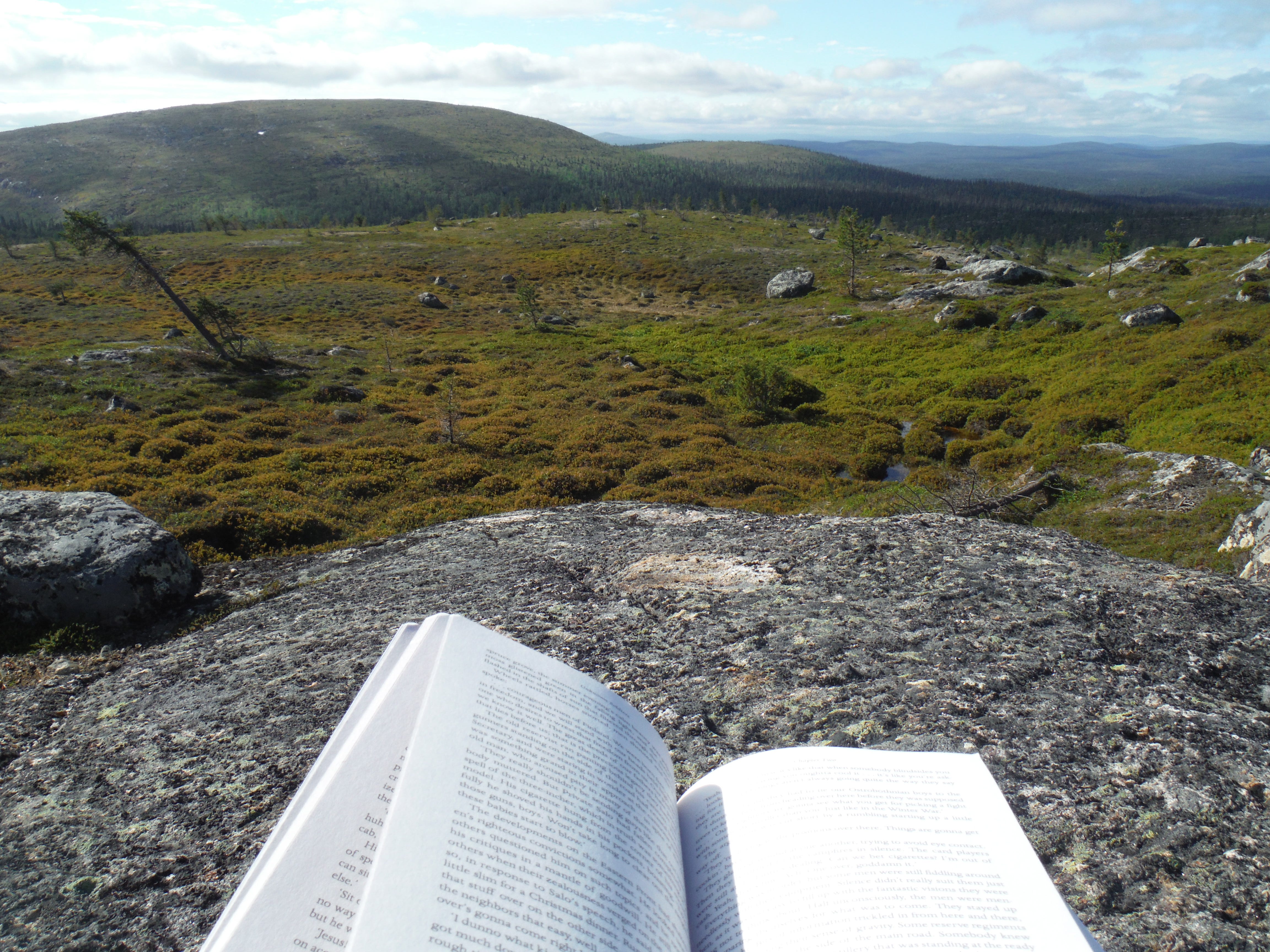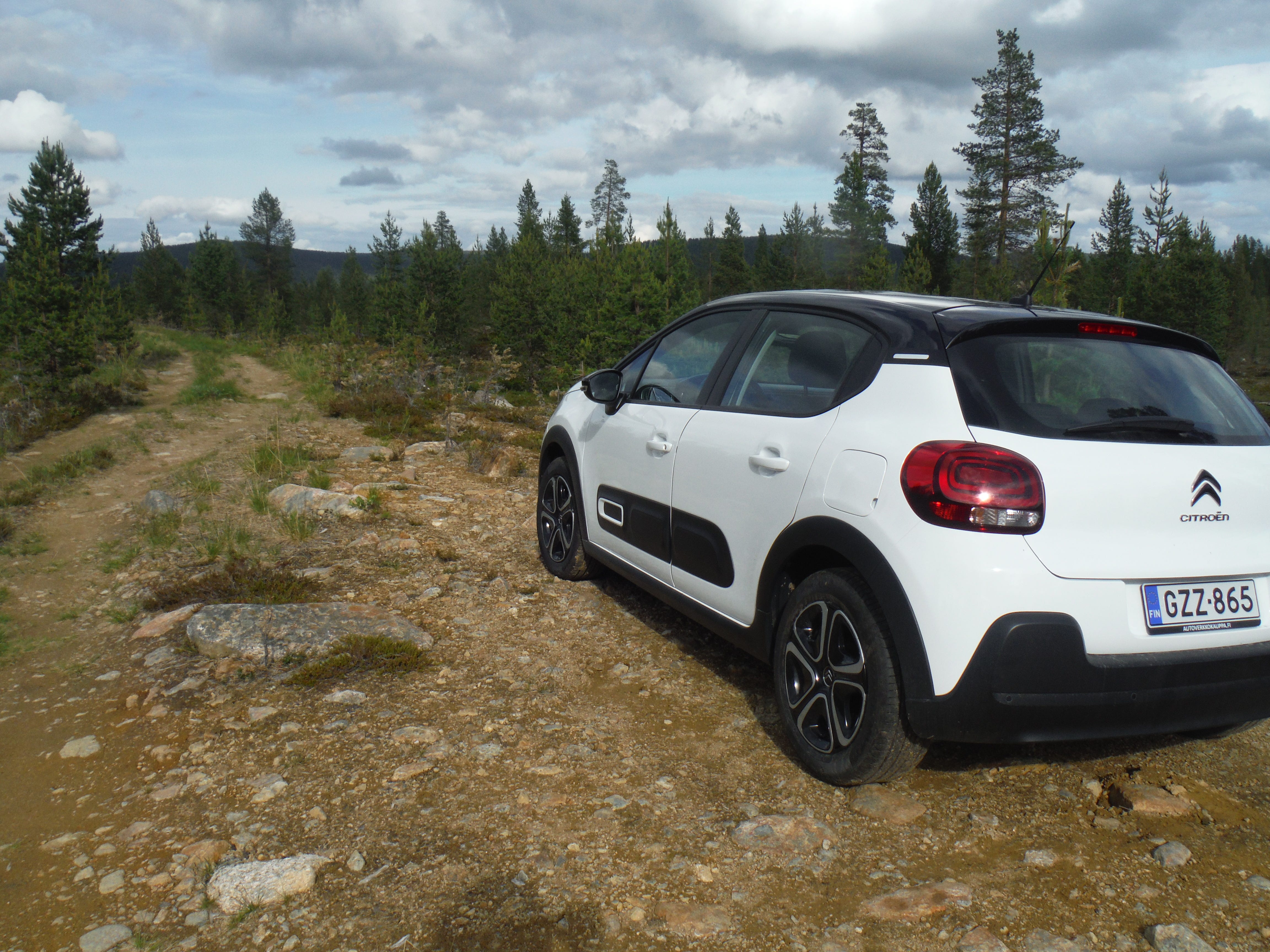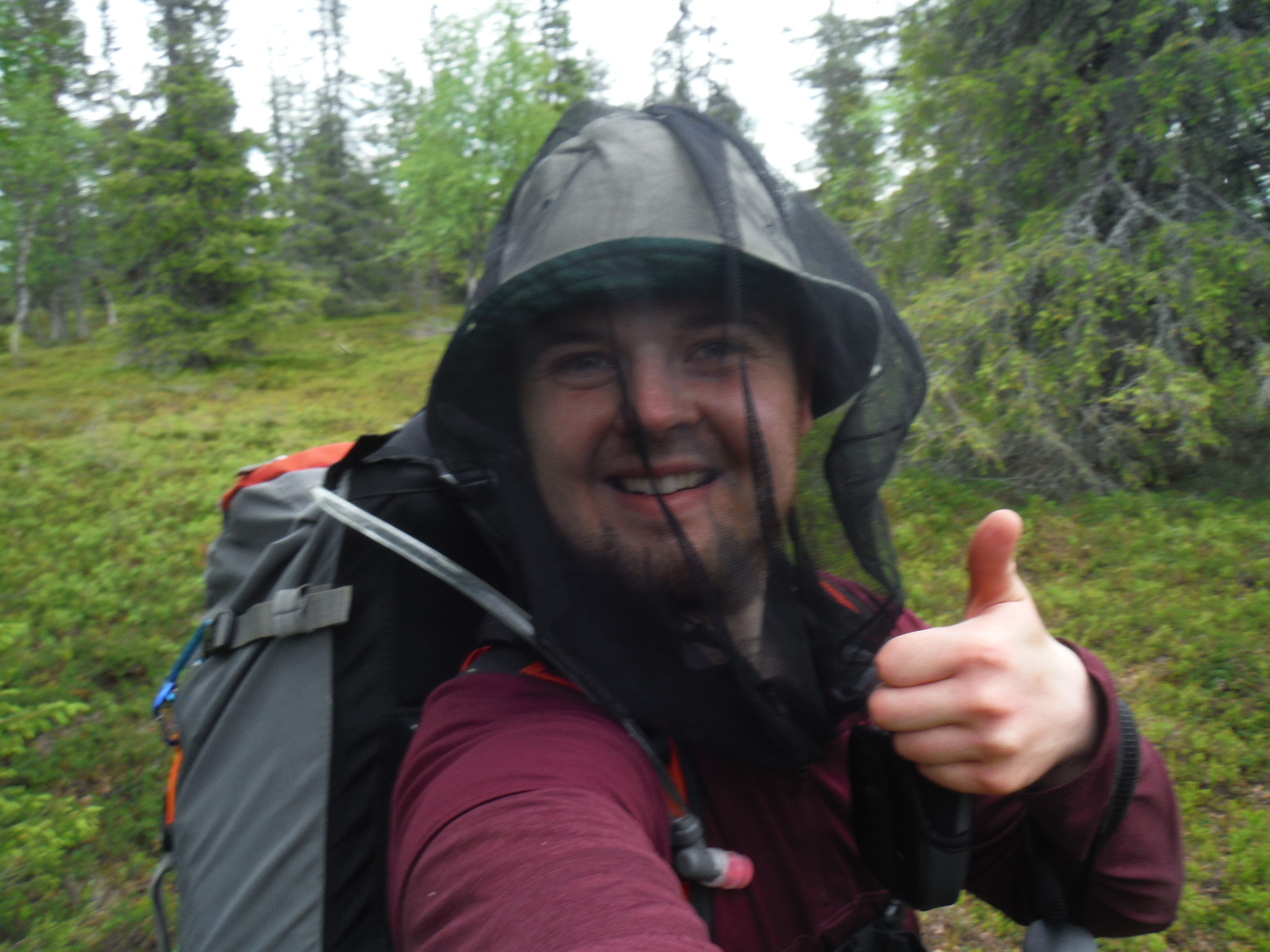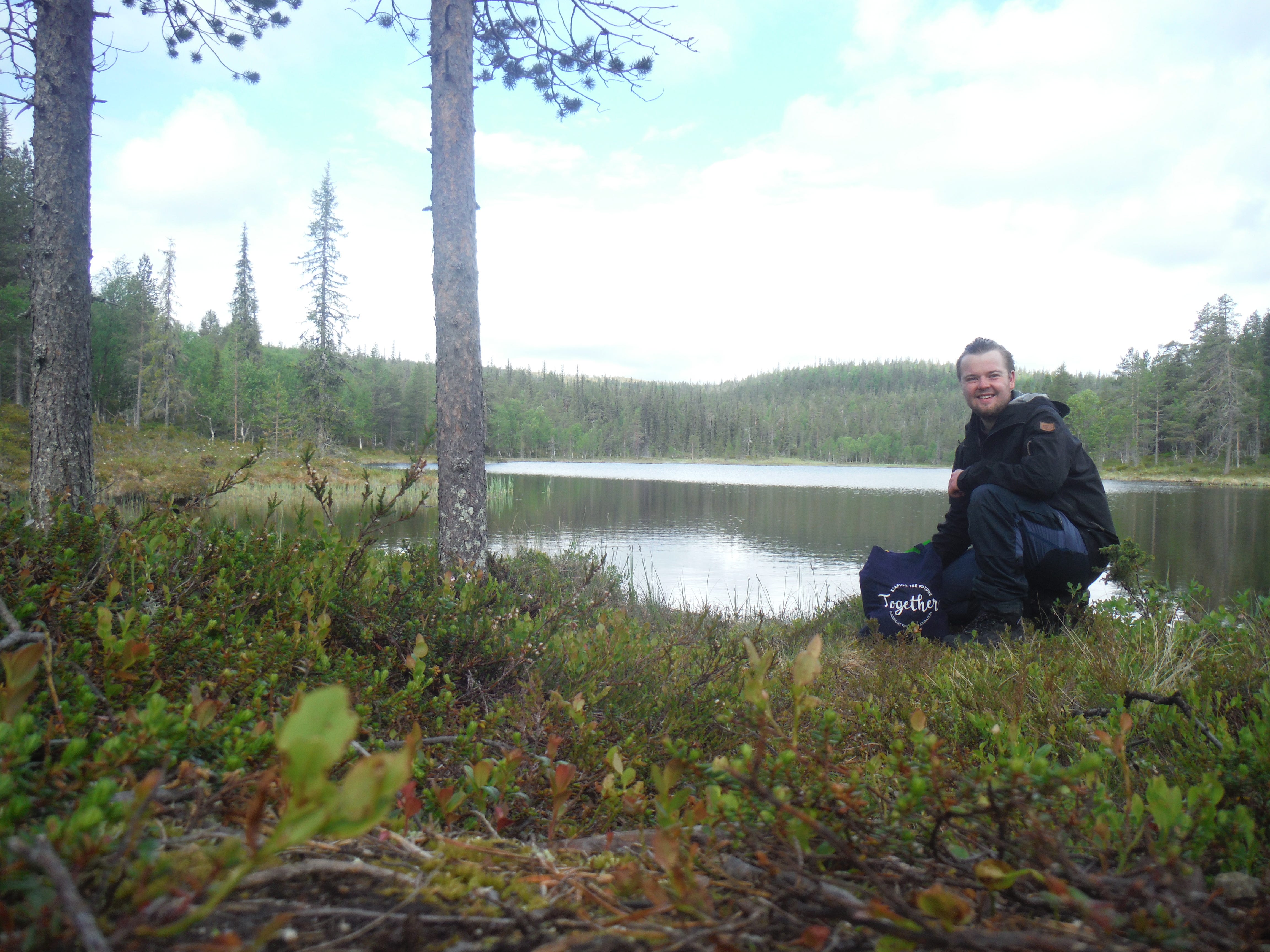Lost in time while solo backpacking the Midnight Sun in Tsarmitunturi Wilderness Area
 Reading atop my first fjäll peak at Tsarmitunturi
Reading atop my first fjäll peak at Tsarmitunturi
Many Finns celebrate the Juhannus or Midsummer holiday by going to a mökki (a small cottage), but I discovered Tsarmitunturi in a guidebook I received for Christmas that year. Tsarmitunturi is a 150 square kilometer Wilderness Area in the east part of Finnish Lapland. The guidebook recommended getting lost in time hiking without a phone or watch during the Midnight Sun when the sun never goes down. I had experience with long haul backpacking from Boy Scouts but never went on an adventure like this. I was alone, off the grid, and far outside my comfort zone. These are my takeaways from venturing into the wilderness.
1. Seek Uncomfort
The roads kept getting bumpier and rockier the closer I got to Tsarmitunturi. I began to wonder if my low-ground clearance rental car could make it. Stopping a few kilometers short of the wilderness area, I parked on the side of a barely navigable dirt road. 150 kilometers from the nearest grocery store in the middle of nowhere in Lapland, I was ready for an adventure.
 The barely navigable dirt road to Tsarmitunturi
The barely navigable dirt road to Tsarmitunturi
There are no marked trails in Tsarmitunturi so I relied on map and compass navigation. As I began hiking into the swampy peatland, I was nervous. My mind filled with questions like “what if I get lost?”After hiking for a few hours, I double checked my compass and heading to make sure it was correct. As I kept hiking, there was a nagging fear in my mind that I wasn’t going the right way. Two kilometers later my fear abated as I broke through the tree line of a large fjäll (small rounded mountain) on the north of the wilderness area.
As I completed my ascent, I felt a sense of accomplishment and relief. I had successfully navigated through the dense forest to my campsite for the second night! Fear is a part of everyone’s life and it is perfectly healthy. What is important is to accept fear and continue forward especially when it is uncomfortable.
When I was preparing for this trip, many advised me that late June in Lapland is prime time for mosquitoes. I packed insect repellent, long pants, sleeves, and a hat complete with netting but nothing could have prepared me for reality. Never before had I heard such a cacophony of insects. A swarm of hundreds of mosquitos was constantly buzzing around my head and they found ways to bite through two layers of clothing. With all the protective gear I had, I ended the trip with over 100 mosquito bites!
 Netting, long pants and sleeves were necessary protection from Mosquitos!
Netting, long pants and sleeves were necessary protection from Mosquitos!
Most would consider a perpetual onslaught of blood sucking pests quite uncomfortable. Had I let the cautionary tales of mosquitoes deter me from hiking in Lapland over midsummer, I would have never experienced the serenity and bliss that comes with being lost in time in the middle of nowhere. Neale Donald Walsch put it best in his quote:
Life begins at the end of your comfort zone.
Uncomfortable situations are unique opportunities for growth. On my third day as I was hiking, I realized I was further south than I had planned. I consulted my map, planned a new course, and set a new heading. From my uncomfort on the first day, I had grown confidence in navigating my own path and charting a new course.
My first night on the trail, I wasn’t very familiar with my camping hammock and the various ways I could set up my tarp. I tried various different combinations of taught line hitches on different trees before settling on a placement I liked. By my final night on the trail, I had mastered setting up camp, filling my water bottles from local springs, and operating my portable stove. In the span of 4 days, my initial uncomfort transformed into confidence as I persevered and built character.
The comfort zone promises things that are easy. Seeking uncomfort promises things that are worth it.
2. Forget being “On Call”
My idea to venture into the wilderness for 4 days without a phone or method of contacting people naturally worried my friends and family. Many responded with some variant of “what if something catastrophic happens to one of your friends and family?” While this is a valid concern, this type of trip is not one that can be easily cancelled once in progress. Having information on a potential tragedy would not enable me to get out of the backcountry or return home to the U.S. any faster. Knowing this information would only cause stress, worry, and ruin the trip.
The rise of cell phones and modern technology have made information access and communication an immediate process. Instant information access has many benefits, but one drawback is creating a feeling of being “On Call.” If a person does not respond to a message promptly people may begin to worry or assume the person is being rude.
Just because someone has a cell phone does not mean they should be online and reachable at all times.
My first day on the trail without my phone, I was filled with FOMO or Fear of Missing Out on messages from my friends and family. By the middle of the second day, I started to forget about my phone and found peace in the solitude and beauty in the wilderness around me. I did not see another person the entire trip and as I hiked, my confidence and character grew.
Being off the grid allowed me to listen to my body and mind. I slept when I was tired, ate when I was hungry, and hiked when I felt energetic. When I returned to my car on the last day, I checked the time. Using the position of the sun to tell time for 4 days, my estimate was only a few hours off of the correct time!
When I reentered normal life and checked my phone nothing monumental had changed. This cemented the realization that my initial FOMO wasn’t valid. My friends and family still cared for me and were excited to hear I had made it out of the wilderness. Even if I had missed something while I was away, there would be other opportunities. The wilderness showed me that it is healthy to have time away from technology and break the cycle of being constantly “On Call.”
3. Value Doing Nothing
When I was planning my trip, I was worried that I would become immensely bored. I planned to bring a book and notepad for journaling but I still wondered how I would occupy those countless hours alone in the woods. Being alone in the wilderness enables the mind to slow down and decompress. This state of doing nothing can initially feel uncomfortable, but once the rhythm of mental busyness is broken, the mind is allowed to relax, focus, and wander.
While sitting atop the summit of a fjäll on my second day, I experienced this state of nothing. I spent the night on that peak and experienced a rare cloudless day in Lapland. I watched the sun complete a revolution in the sky, dipping towards the horizon but never setting. I made camp, found water from a distant spring, read a book, and made food.
Once I had taken care of all the essentials, I began to wonder what to do. I found a rock atop the fjäll and sat for what felt like hours. I marveled at the nature around me. I thought how grateful I was to be in this place so few people will ever see. My mind was calm, and as I pondered the serenity of the unknown time passing, I realized I discovered a time-honored practice. Known as mindfulness, meditation, or a myriad of other names this state can only be unlocked by prioritizing a state of doing nothing.
4. Be Present
How often have you observed a restaurant or café where the majority of people are engrossed in their mobile devices? People are loosing the ability to engage with and appreciating the environment around them. Precious moments loose their sanctity when they are recorded, posted, and shared with everyone on social media. The value of the moment is being present in it, not the recording of it for later.
The proliferation of instantly accessible entertainment, media, and games through technology has created boredom pacifiers. These boredom pacifiers create constant stimulation which prevents relaxation. In the wilderness, these pacifiers do not exist. Instead you become immersed in the rustling of pine needles, symphony of insects, and placid lakes.
 A placid lake on my final night in the backcountry
A placid lake on my final night in the backcountry
As I hiked, many of my questions could be easily answered with an internet search. For example, as I sat upon a fjäll I wondered where the river I saw far in the south runs. The river was far away and my paper map of Tsarmitunturi did not reach that far. There was pleasure in having a question and not knowing the answer. In that moment it was me, the fjäll, and the distant river.
Technology has nearly eliminated these moments of presence. Any time someone has a question, a friend is quick to pull out a cell phone and provide information on not only where the river runs but what fish it contains and what tributaries it has. Instead of being present with our friends and the environment around us, we turn to technology. It is okay to not immediately know the answer to a question. There is value in speculation and playfull argument, and that is only possible when people are intentionally present in a moment, away from technology.
Conclusion
I came to Finland because of a Fulbright Grant to study a master’s degree. Venturing into the wilderness imparted knowledge and wisdom on me that no textbooks or university lectures ever could. People often ask me what the highlight of my Fulbright Finland experience was, and the answer is easy: Tsarmitunturi.
As an academic scholarship program, some may imagine countless hours spent studying and preparing for exams being the pillar of a successful Fulbright experience. While those elements are critical, they are simply a foundation for what one can achieve during a Fulbright grant. By being lost in time during the Midnight Sun, I had an incredibly unique opportunity for personal growth and development. Returning home, I began using the lessons from the wilderness for growth and I hope you will too!